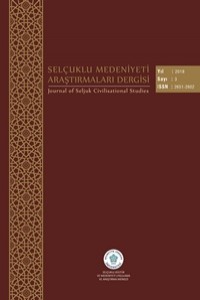Öz
Ebu’l-Ferec
İbnü’l-Cevzî, miladî XII. Yüzyılda Bağdat’ta yaşamış bütünlükçü bir İslam
âlimidir. İslamî ilimlerin her dalında eserler vermiştir. Özellikle Telbîsü
İblîs adlı eseri tasavvuf ve kelam ilmi
açısından önemlidir. İbnü’l-Cevzî, hem Abbasiler ve hem de Büyük Selçuklu
Devleti iktidarlarını görmüştür. Her iki devirde de bir âlim ve aydın
sorumluluğuyla hareket etmiş, içinde yaşadığı toplumun itikâdî ve ahlakî
sorunlarıyla yakından ilgilenmiştir.
İbnü’l-Cevzî, Şiî-Bâtınî fırkaların İslam toplumunda karışıklıklar
çıkardığı bir dönemde, onların itikadî görüşlerini eleştirmiş ve Ehl-i sünnet
itikadını savunmuştur. İbnü’l-Cevzî, tasavvuf ilmini İslam’ın bir yorum biçimi
olarak görmüştür. Bununla birlikte Kelam ilminin akla ve vahye dayanan
yöntemiyle kendi döneminde yaşayan bazı sûfilerin Kur’an ve Sünnete aykırı
görüşlerine içeriden tenkitler yöneltmiştir. Yazar, bu eleştirilerinde ilmî
kriterlerden ayrılmamış, mezhep ve meşrep fanatizmine de gitmemiştir. Ayrıca Telbîsü İblîs adlı eserinde hem
sûfileri eleştirmiş ve hem de İslamî ilimlerin yöntemleri konusunda önerilerde
bulunmuştur. Onun bu önerilerinin, İslamî ilimlerin metodolojilerinin tartışıldığı
bir dönemde yararlı olacağını düşünüyorum.
İşte biz “İbnü’l-Cevzî’de
Tasavvuf-Kelam Münasebetleri” adını verdiğimiz bu makalede, onun entelektüel
hayatı, İslam düşünce tarihindeki yeri ve sûfilere yönelttiği bazı eleştirileri
üzerinde durduk.
Anahtar Kelimeler
Kaynakça
- Afîfî, Ebu’l-A’lâ, Tasavvuf, (trc. Ekrem Demirli- Abdullah Kartal), İstanbul, 1996.
- Altıntaş, Ramazan, “Haşviyye’nin Doğuşu ve Kelamî Görüşleri”, C.Ü.İlahiyat Fakültesi Dergisi, Sivas–1999, Sayı: 3, ss. 57–100.
- Âşıkoğlu, Nevzat Yaşar, İbnü’l-Cevzî ve Bid’at Anlayışı, (Basılmamış Lisans tezi), A.Ü.İ. Fakültesi, Ankara, 1984.
- Bağdadî, Abdülkâhir, el-Fark Beyne’l-Fırak, (nşr.,Muhammed Muhyiddîn Abdülhamîd), Beyrut, 1990.
- Boyacılar, Nureddîn, İbnü’l-Cevzî’nin Hadis’teki Yeri ve Hadis Metodu, (Basılmamış Doktora tezi), A.Ü. Sosyal Bilimler Enstitüsü, Ankara, 1978.
- Ebû Tâlib el-Mekkî, Kûtu’l-Kulûb, Kahire, 1315.
- Günaltay, Şemseddîn, “İslam Dünyasının İnhitatı Sebebi Selçuk İstilâsı mı?”, II. Türk Tarih Kongresi Zabıtları, İstanbul, 1943, s. 363.
- Hasan İbrahim Hasan, Târîhu’l-İslam, Kahire, 1968.
- Hucvîrî, Ebu Ali Cüllâbî, Keşfu’l-Mahcûb, (trc., Süleyman Uludağ), İstanbul, 1982.
- İbnü’l-Cevzî, Ebü’l-Ferec Cemâlüddîn Abdurrahmân b. Alî b. Muhammed el-Bağdâdî, Def’u Şübehi’t-Teşbîh, (tahk. Hasan es-Sakkâf), Amman, 1992.
- İbnü’l-Cevzî, Ebü’l-Ferec Cemâlüddîn Abdurrahmân b. Alî b. Muhammed el-Bağdâdî, Kitâbu’l-Mevzûât, (tahk. Abdurrahman Muhammed b. Osman), Medine, 1966.
- İbnü’l-Cevzî, Ebü’l-Ferec Cemâlüddîn Abdurrahmân b. Alî b. Muhammed el-Bağdâdî, M. Zemmi’l-Hevâ, (tahk. İbrahim M. Ramazan), Beyrut, 1993.
- Kelâbâzî, Muhammed b. İshâk, Ta’arruf, (haz., Süleyman Uludağ), İstanbul, 1992.
- Kuşeyrî, Abdülkerim, Risâle- i Kuşeyrî, (trc., Süleyman Uludağ), İstanbul, 1991.
- Şakir Mustafa, et-Târîhu’l-Arabî ve’l-Müerrihûn, Beyrut, 1987.
- Taftazânî, Sa’deddîn, Şerhu’l- Makâsıd, İstanbul, ts.
- Turan, Osman, Selçuklular Tarihi ve Türk-İslam Medeniyeti, İstanbul, 1980.
- Uludağ, Süleyman, Tasavvuf Terimleri Sözlüğü, İstanbul, 1991.
- Yavuz, Yusuf Şevki-Avcı, Casim, “İbnü’l-Cevzî” DİA, İstanbul, 1999, XX, 543.
- Zehebî, Şemsuddin Muhammed b. Ahmed, Siyeru A'lâmi'n-Nubelâ, thk., Beşşar Avvad, Beyrut: Müessesetü'r-Risale, Beyrut, 1981.
Öz
Abu’l-Faraj ibn
al-Jawzī is a Muslim scholar of Baghdad who lived in 12th century. He wrote
books on almost all branches of Islamic sciences. His Talbisu Iblis is
especially of great importance in view of Sufism and Islamic theology. Ibn al-
Jawzī witnessed both the Abbasid and the Great Seljuq Empires. He behaved in
accordance with his responsibility as a scholar and as an intellectual during
both reigns, and dealt closely with the moral and theological matters of the
society he lived in. Ibn al- Jawzī
criticized the theological views of Shiite- Bātinī groups in a period when
these groups caused confusion within the Muslim society, and he defended the
creed of Ahl al-Sunnah. Ibn al- Jawzī considered Sufism (tasawwuf) as a form of
interpretation of Islam. However, he criticised the apparently inconsistent
opinions of some Sufis in his period with Quran and Sunnah by means of his
method depending on the intellect and the revelation. He never left the
scholarly criteria in these critiques and never appealed to the sectarian
fanaticism. Moreover, he not only criticised the Sufis in his Talbisu Iblis
but also put forth suggestions concerning the methods of the Islamic sciences.
I think his suggestions are beneficial in this period in which the
methodologies of Islamic sciences are discussed. In this article, we will try
to explain his intellectual life, his place in the history of Islamic thought
and some of his critiques concerning the Sufis.
Anahtar Kelimeler
Sufism (tasawwuf) Islamic Theology (Kalām) Ahl-i Bid’a Sect Islamic School of Thought
Kaynakça
- Afîfî, Ebu’l-A’lâ, Tasavvuf, (trc. Ekrem Demirli- Abdullah Kartal), İstanbul, 1996.
- Altıntaş, Ramazan, “Haşviyye’nin Doğuşu ve Kelamî Görüşleri”, C.Ü.İlahiyat Fakültesi Dergisi, Sivas–1999, Sayı: 3, ss. 57–100.
- Âşıkoğlu, Nevzat Yaşar, İbnü’l-Cevzî ve Bid’at Anlayışı, (Basılmamış Lisans tezi), A.Ü.İ. Fakültesi, Ankara, 1984.
- Bağdadî, Abdülkâhir, el-Fark Beyne’l-Fırak, (nşr.,Muhammed Muhyiddîn Abdülhamîd), Beyrut, 1990.
- Boyacılar, Nureddîn, İbnü’l-Cevzî’nin Hadis’teki Yeri ve Hadis Metodu, (Basılmamış Doktora tezi), A.Ü. Sosyal Bilimler Enstitüsü, Ankara, 1978.
- Ebû Tâlib el-Mekkî, Kûtu’l-Kulûb, Kahire, 1315.
- Günaltay, Şemseddîn, “İslam Dünyasının İnhitatı Sebebi Selçuk İstilâsı mı?”, II. Türk Tarih Kongresi Zabıtları, İstanbul, 1943, s. 363.
- Hasan İbrahim Hasan, Târîhu’l-İslam, Kahire, 1968.
- Hucvîrî, Ebu Ali Cüllâbî, Keşfu’l-Mahcûb, (trc., Süleyman Uludağ), İstanbul, 1982.
- İbnü’l-Cevzî, Ebü’l-Ferec Cemâlüddîn Abdurrahmân b. Alî b. Muhammed el-Bağdâdî, Def’u Şübehi’t-Teşbîh, (tahk. Hasan es-Sakkâf), Amman, 1992.
- İbnü’l-Cevzî, Ebü’l-Ferec Cemâlüddîn Abdurrahmân b. Alî b. Muhammed el-Bağdâdî, Kitâbu’l-Mevzûât, (tahk. Abdurrahman Muhammed b. Osman), Medine, 1966.
- İbnü’l-Cevzî, Ebü’l-Ferec Cemâlüddîn Abdurrahmân b. Alî b. Muhammed el-Bağdâdî, M. Zemmi’l-Hevâ, (tahk. İbrahim M. Ramazan), Beyrut, 1993.
- Kelâbâzî, Muhammed b. İshâk, Ta’arruf, (haz., Süleyman Uludağ), İstanbul, 1992.
- Kuşeyrî, Abdülkerim, Risâle- i Kuşeyrî, (trc., Süleyman Uludağ), İstanbul, 1991.
- Şakir Mustafa, et-Târîhu’l-Arabî ve’l-Müerrihûn, Beyrut, 1987.
- Taftazânî, Sa’deddîn, Şerhu’l- Makâsıd, İstanbul, ts.
- Turan, Osman, Selçuklular Tarihi ve Türk-İslam Medeniyeti, İstanbul, 1980.
- Uludağ, Süleyman, Tasavvuf Terimleri Sözlüğü, İstanbul, 1991.
- Yavuz, Yusuf Şevki-Avcı, Casim, “İbnü’l-Cevzî” DİA, İstanbul, 1999, XX, 543.
- Zehebî, Şemsuddin Muhammed b. Ahmed, Siyeru A'lâmi'n-Nubelâ, thk., Beşşar Avvad, Beyrut: Müessesetü'r-Risale, Beyrut, 1981.
Ayrıntılar
| Birincil Dil | Türkçe |
|---|---|
| Bölüm | Araştırma Makaleleri |
| Yazarlar | |
| Yayımlanma Tarihi | 19 Aralık 2018 |
| Gönderilme Tarihi | 5 Ekim 2018 |
| Yayımlandığı Sayı | Yıl 2018 Sayı: 3 |
Kaynak Göster


